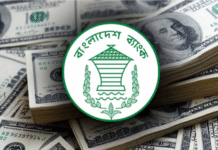Govt looking for alternatives as CETP construction drags on

The government is planning to incentivise private tanneries in setting up their own effluent treatment plants in Savar Tannery Industrial Estate (STIE) to expedite the attainment of the much-required Leather Working Group (LWG) certification to increase leather goods exports.
Salman F Rahman, the prime minister’s private industry and investment adviser, yesterday asked Commerce Secretary Md Jafar Uddin to look for such scope, reasoning that there would be delays making the STIE’s central effluent treatment plant (CETP) fully functional.
He was addressing a virtual meeting on the future of Bangladesh’s leather sector in the aftermath of the Covid-19 jointly organised by the Economic Reporters’ Forum (ERF), the Asia Foundation and the Research and Policy Integration for Development (RAPID).
So far, three tanneries have obtained approval to construct their ETPs to secure the LWG certification and avail better export prices from international retailers and brands.
The certification of the global compliance audit organisation provided in different categories depends on compliance to standards, including on the use of ETPs and a dedicated site for tanneries.
The Bangladesh Small and Cottage Industries Corporation (BSCIC), the STIE’s authority, is yet complete the construction of the CETP, which was taken up in 2012. The work started in 2014 and it was scheduled to complete by 2017.
As of July, Tk 879 crore was spent for the project, according to STIE officials.
The construction is mired with challenges such as changing of project directors several times over the years, fund crisis, legal battles, bureaucratic tangles and delays by Chinese engineers.
Rahman yesterday suggested hiring a private management team to run the STIE and the CETP for three to five years to ensure full functionality.
He cited two tenders that have already been floated for solid waste management at the site.
Rahman also spoke of seeking tie-up opportunities with Vietnam so that local leather could avail higher prices from exports.
Vietnam does not have its own source of rawhide, the raw materials for leather and leather goods, while Bangladesh has plenty of them.
So, Bangladesh could send the raw materials to Vietnam for making goods although there is a chance of Vietnam demanding LWG certifications. Vietnam has 14 LWG-certified leather goods industries.
The adviser favoured signing free trade agreements (FTAs) with major partners to enjoy duty benefits once the country’s graduated from a least developed one to a developing country in 2024.
Till date, Bangladesh could not sign any FTA with any country. Earlier this month, the cabinet approved a preferential trade agreement with Bhutan.
Regarding the CETP, Rahman said its trial discharge in May, June and July had met the standards of the Department of Environment.
It could not be maintained in August and September as the STIE was processing collections of Eid-ul-Azha, when half of the country’s annual rawhide sourcing occurred.
He said the government would impose a tax on tanneries unable to control water use, which was currently free of charge for them.
There is a big link between tourism and footwear and leather goods business, said Syed Nasim Manzur, managing director of Apex Footwear.
The tourism industry declined by 58 per cent to 78 per cent globally because of the fallouts of the Covid-19 pandemic, which caused the consumption of footwear to decline by 22.50 per cent globally, he said.
Manzur demanded that the leather and leather goods industries be provided benefits equal to those extended to the industries like those for garment export so that the country could ship more leather and leather goods.
His company received the approval from the government last month to construct a private ETP.
Manzur also said Vietnam’s leather and leather goods export has been increasing thanks to its FTAs with the European Union and Japan.
Jafar Uddin said the commerce ministry is going to hold a meeting next month to decide the fate of the leather and leather goods industries so that the miseries faced during the last two Eid ul Azha festivals are not repeated.
The government has taken up projects to improve the skills and technologies in the leather sector and allowed the export of rawhide and wet blue to create demand for the items.
While presenting a keynote paper, MA Razzaque, research director of the Policy Research Institute of Bangladesh, said global production of footwears reached $24.3 billion pairs in 2019.
India has a share of 12 per cent of the global production, of which 95 per cent is for domestic consumption.
Bangladesh produces 380 million pairs of shoes annually. With rising GDP, the domestic market is also expanding. But the domestic market is protected by tariffs, Razzaque said.
Abu Eusuf, a professor of the Development Studies of the University of Dhaka, in his keynote paper, said almost 85 per cent of the raw materials required for the industries are sourced from the domestic markets.
Around 20 per cent of the population buys shoes worth $50 on average every year and the percentage of the users is increasing, he said.
Mohiuddin Ahmed Mahin, president of the Bangladesh Finished Leather, Leather Goods and Footwear Exporters Association, said many of the tanneries have become defaulters because of the bank borrowing over the years.
Many could not do well in business because of the slow progress of the CETP. However, nobody is taking the responsibility of the slow progress of the CETP, he said.
Shaheen Ahmed, chairman of the Bangladesh Tanners Association, said the export of leather declined significantly because of low demand from international buyers due to the Covid-19.
The question raised about the capacity of the CETP as the environmental pollution could not be stopped at the STIE, he said.
Every year, 70,000 tonnes of solid waste is produced at the STIE, he said, adding the government needs to manage the waste to protect the environment.
Asia Foundation Country Representative Kazi Faisal Bin Seraj, ERF President Saif Islam Dilal and General Secretary SM Rashidul Islam also spoke.









